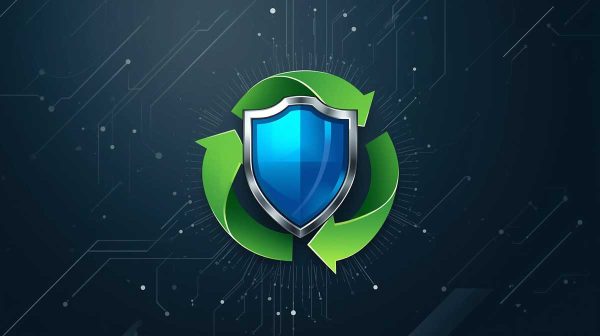What are managed cybersecurity services?

Most small business owners assume they’re not a target. They figure hackers are chasing big corporations, government agencies, or large financial institutions—not a ten-person office running a local operation.
But that’s precisely what makes smaller businesses attractive: fewer defenses, fewer processes, and fewer people paying attention. Cybercriminals know it, and they’re taking advantage of it.
Cybersecurity isn’t just about locking down Fortune 500 companies anymore. The reality is that any business connected to the internet is a potential target. Ransomware attacks, phishing emails, and data breaches hit small businesses daily, often causing devastating financial and reputational damage. For many, even a single incident is enough to shut the doors for good.
That’s where managed cybersecurity services come in. Instead of relying on one-off tools or hoping employees will recognize every suspicious email, businesses can partner with a provider who actively manages security across the board.
From monitoring networks and patching systems to training staff and responding to threats, managed services bring expertise and consistency that most small businesses can’t achieve independently.
Understanding how managed cybersecurity works isn’t about fear but prevention. Knowing the risks, the limitations of traditional tools, and the value of proactive defense can help small business owners make smarter decisions before a crisis happens.
Why small businesses are prime targets

It’s easy for a small business owner to assume cybercriminals have bigger fish to fry. After all, why would hackers waste their time on a local shop, a small accounting firm, or a ten-person construction company? But that assumption is precisely what makes smaller businesses such an appealing target.
Cybercriminals know that most small businesses lack the same resources as large corporations. They typically don’t have full-time IT staff, enterprise-grade security systems, and well-documented policies. That means gaps—sometimes huge ones—in defenses. From outdated software and weak passwords to unmonitored devices and untrained employees, an attacker can exploit countless entry points.
Even more, small businesses often don’t realize they’ve been breached until it’s too late. Many threats operate silently in the background, gathering information, installing ransomware, or siphoning off sensitive data without drawing attention. By the time the problem surfaces, the damage is already done.
The numbers don’t lie. Studies show that most cyberattacks target small and midsize businesses, not global enterprises. Attackers go where defenses are weakest; unfortunately, that often means the local businesses we depend on daily.
This doesn’t mean small businesses are helpless but need a smarter, proactive approach. That’s where managed cybersecurity services change the equation, providing enterprise-level protection scaled to fit small business needs.
The limits of antivirus and one-off tools
For years, small businesses assumed antivirus software was enough to stay safe. Install a program, let it run in the background, and you’re covered—or so the thinking went. The problem is that today’s threats don’t look or behave like traditional computer viruses, which means antivirus software alone is no longer enough.
Here are some of the gaps that antivirus and one-off tools can’t fully protect against:
- Phishing attacks that trick employees into giving up passwords or sensitive data
- Social engineering schemes that rely on human error, not malware, to gain access
- Unpatched software that leaves open doors for attackers to exploit
- Cloud-based threats that target email, file sharing, or collaboration platforms
- Silent breaches that operate undetected for weeks or months before causing damage
Relying on a single tool creates a false sense of security. Business owners assume they’re covered, but critical blind spots are left unmonitored. And because threats constantly evolve, even the best antivirus program is only as good as its last update.
This doesn’t mean antivirus has no place—it’s still a valuable part of the picture. But without ongoing monitoring, updates, and layered defenses, it’s like locking your front door while leaving every window in the house wide open. That’s the gap managed cybersecurity services are designed to close.
Managed cybersecurity as ongoing protection

Cybersecurity isn’t something you set up once and forget about. Threats change daily, software updates roll out constantly, and attackers always look for new ways in. That’s why managed cybersecurity is built around ongoing protection—not a one-time project.
With managed services, your systems are monitored 24/7. Suspicious activity is flagged immediately, patches are applied quickly, and vulnerabilities are addressed before exploitation. Instead of waiting for a problem to surface, a managed provider takes a proactive role, watching over your network, devices, and cloud accounts so you don’t have to.
This ongoing approach also means you’re not relying on guesswork or hoping employees spot red flags on their own. Managed providers use layered tools—firewalls, threat detection, email filtering, and more—all coordinated and kept up to date. The goal is to close as many doors as possible while ensuring the remaining few are securely locked.
For small businesses, the benefit is peace of mind. You don’t need a full-time cybersecurity staff or the budget of a large corporation to get enterprise-level protection. A managed service scales security to fit your business, giving you access to the tools and the expertise needed to keep pace with modern threats.
Cost of ignoring proactive security
Cybersecurity can feel like one of those “someday” investments—something you’ll get to once business slows down or the budget looks better. The problem is that waiting often costs far more than prevention. Ignoring proactive security leaves your business vulnerable to risks that hit hard and fast.
Here are some of the most significant costs small businesses face when they skip managed cybersecurity:
- Lost revenue from downtime
- Data recovery expenses after a breach
- Regulatory fines for compliance failures
- Damage to reputation and customer trust
- Increased insurance premiums or denial of coverage
Even one of these outcomes can strain a small business, but together they’re enough to push many companies past the breaking point. And unlike a flat monthly fee for managed services, these costs are unpredictable—you don’t know when they’ll hit or how much damage they’ll do.
That’s why proactive protection isn’t just about technology. It’s a financial safeguard, a way to replace uncertainty with stability, and a chance to keep your business running smoothly when others are scrambling to recover.
Building a culture of security with a managed partner

Cybersecurity isn’t just about tools—it’s about people. A firewall or antivirus program won’t stop someone from clicking on a malicious link in an email. That’s why true protection requires building a culture of security inside your business, and managed services play a central role in making that possible.
When you work with a managed cybersecurity provider, you’re not just outsourcing the technical pieces—you’re gaining a partner who can guide your team toward safer habits. That may include training employees to recognize phishing attempts, running simulated attacks to test awareness, or helping you implement policies for password management and device usage.
Over time, those practices become second nature, reducing the likelihood of human error leading to a serious breach.
A managed partner also brings accountability and consistency. Instead of hoping employees remember updates or security checks, your provider ensures systems are patched, threats are monitored, and compliance standards are met. They create structure where small businesses often rely on ad hoc efforts, filling in the gaps with expertise and discipline.
The result is more than better defenses—it’s a workplace where everyone plays a part in protecting the business. With the right partner, security stops being a box to check and becomes part of your company’s DNA.
Protect your business with managed cybersecurity
Cyber threats aren’t slowing down, and small businesses can’t afford to treat security as an afterthought. The risks are real, but the good news is that protection doesn’t have to be out of reach. With managed cybersecurity services, you gain a partner who not only brings the right tools but also the oversight, training, and consistency your business needs to stay ahead of attackers.
If you’ve been relying on antivirus alone—or assuming your business is too small to matter—it’s time to rethink your strategy. Proactive, managed security gives you peace of mind, reduces the chance of costly downtime, and ensures your team can focus on running the business instead of reacting to the latest threat.
Contact us today to see how managed cybersecurity can safeguard your systems, data, and reputation.
